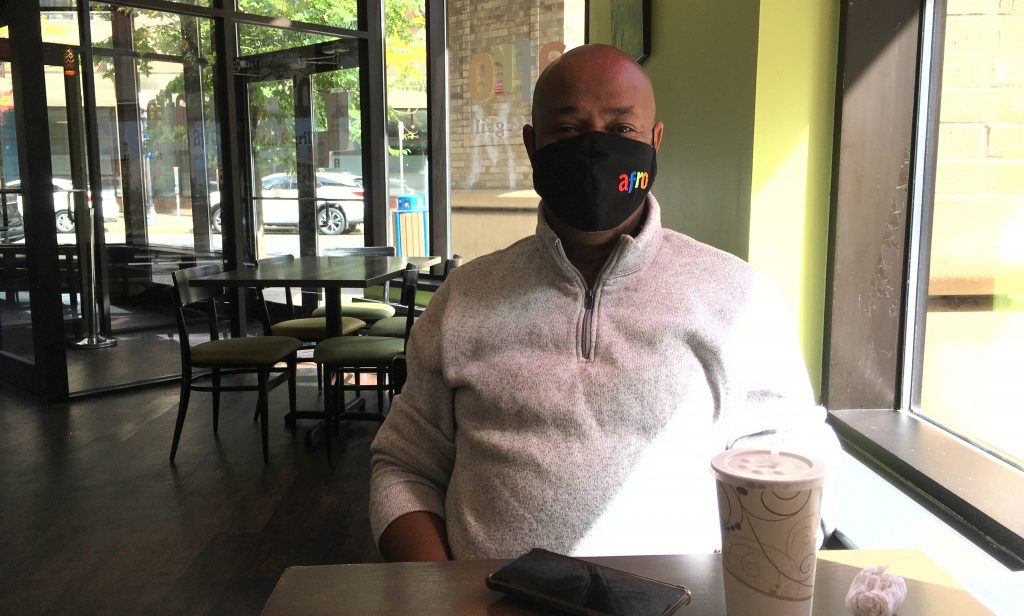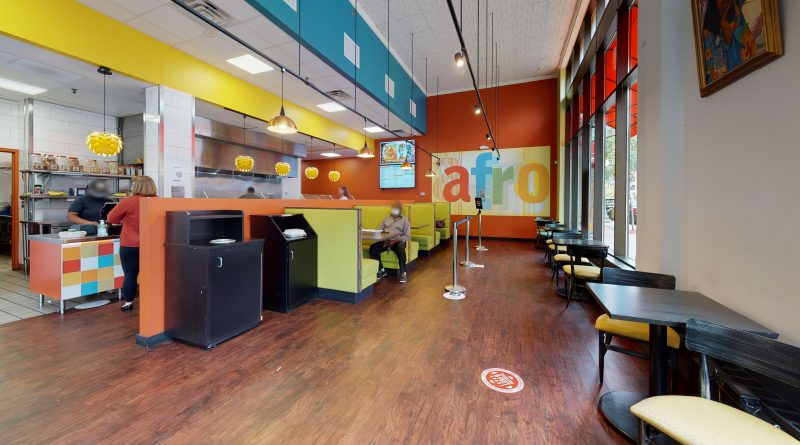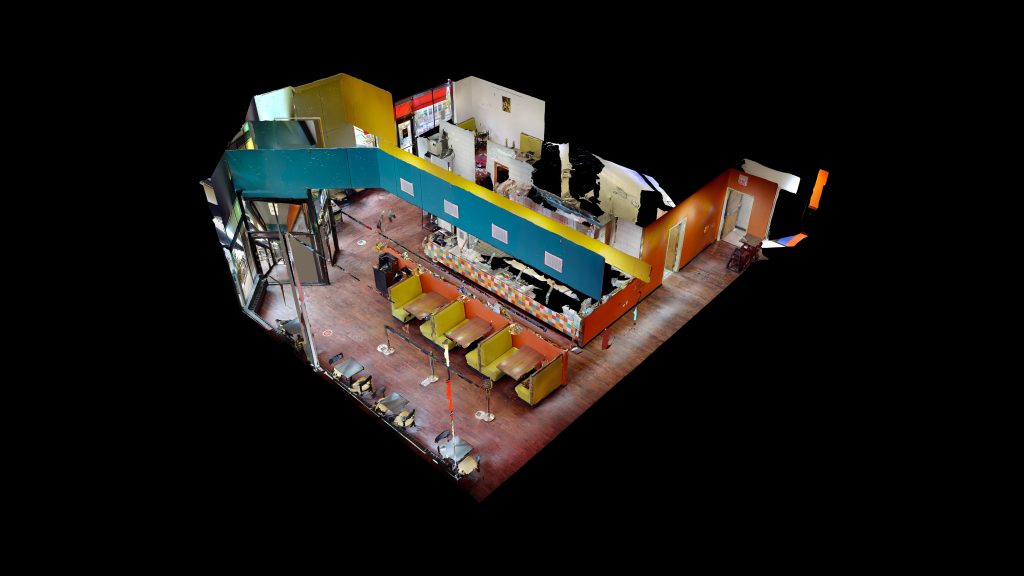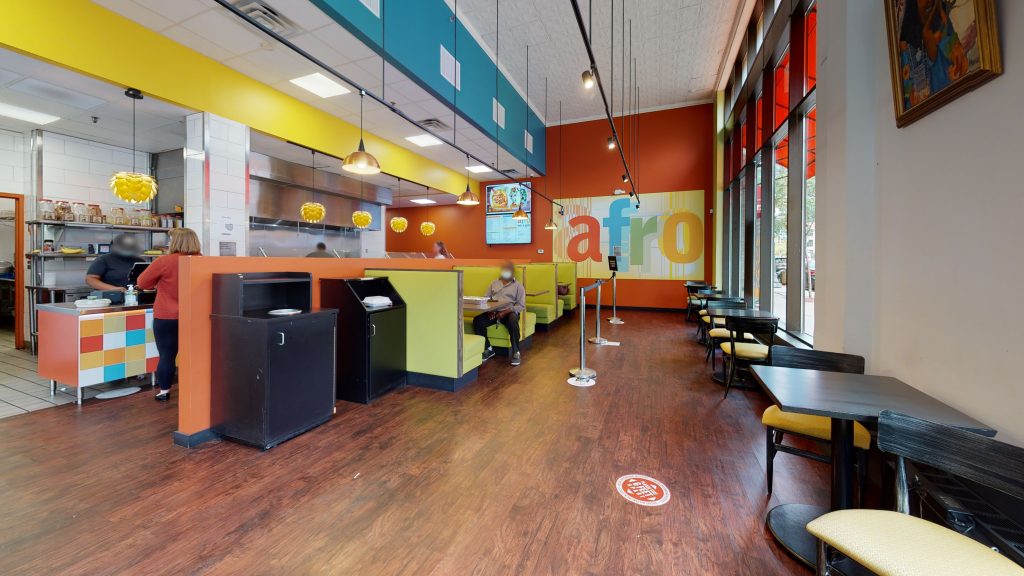Somali Hospitality at Afro Deli in St. Paul
When I decided to dive down the rabbit hole of Matterport, I suspected that the platform would be overwhelmingly defined by its use for high-end real estate. I wasn’t wrong. A realtor friend in DC told me that she’s had to pay $1000 or $1500 for a full set of scans, photos, and video (!). This wasn’t, of course, my objective with the machine. Sort of like how I am less excited about “green building” if it’s just building net-zero million-dollar homes. S, on a whim, I wrote to the company mentioning this and suggesting the idea of using the platform to promote small business, disadvantaged business enterprise, and spaces of cultural or economic interest to a broader cross-section of society. Surprisingly, they wrote back almost immediately, and we were able to set up a call to talk about it. (This is not unlike how I got the Ford job, incidentally).
.@AfroDeli, in partnership with @USBank, has distributed 200 hot meals to health care workers at M Health Fairview University of Minnesota Medical Center in Minneapolis. pic.twitter.com/vuF0UH6TgG
— Sahan Journal (@SahanJournal) April 21, 2020
THE SPOT
Afro Deli was one of the first companies in the Twin Cities I wrote to after discovering a few lists of black-owned businesses assembled in the aftermath of the murder of George Floyd. The company made headlines earlier this year for providing food to the community as an alternative to a COVID-effected shutdown. Owner Abdirahman Kahin, a Somali refugee who came to the United States in 1997, made the tough call to close the deli’s two Skyway locations as the pandemic essentially ended a reliable stream of downtown office workers in Minneapolis and St. Paul. But the flagship location in downtown St. Paul and the other location in Minneapolis remain open. As I scan, a few dozen people come in, well after the lunch rush. Most are picking up carryout. Some are dining in while others enjoy the cool fall weather on the patio outside. West 7th Place here, on which the deli’s patio sits, is a pedestrianized strip between St. Peter and Wabasha. The historic Palace Theater (1916) fronts on the pedestrianized street, too.

THE SNACKS
This is a volunteer effort on my behalf, but Kahin hooks me up on my way out– with a veritable feast. I assemble an eclectic order to take with me to meet up with an old friend in Minneapolis. Veggie curry– and, of course, hot wings, because why not? Kahin also insists that I try a few sambusas— the Somali and Ethiopian version of what I know as a samosa from South Asian restaurants. This one has lentils in it, which is an instant win for me, and a deeper and more complex flavor profile than what I’m typically thinking of when I think of an Indian restaurant samosa.
As I’m wrapping up, I connect with Amin Omar, a colleague of Kahin’s who invites me to sit. I tell him I don’t want to interrupt his lunch.
“This is how we do in my culture,” Omar says, beckoning, “we eat when we talk.”
Food, of course, brings us all together– which is largely why I’m starting with restaurants in the first place. This isn’t a new idea, by any means, but it’s also a I tell him about the Matterport project. Omar, who is Somali by way of Djibouti, started an organization here, Horn of Africa, which aims to address the issue of both food– and cultural- insecurity. In 2020, Minneapolis is nursing multiple fractures, between uncomfortable and even hostile community relations with police, the Muslim-American community struggling against nativist, populist, and xenophobic rhetoric coming out of Washington, and COVID19 effecting massive disruptions to local economy. Omar’s organization is feeding residents while also bringing together often disparate groups to sit down and break bread with one another.

THE TALK
“Everybody’s just having a regular talk,” he says. “That is what is missing [… and at the end of the day, nobody hates the person, it’s just that the communication isn’t there. It’s been going like that for years and years, and it just builds up.”
“It builds up, and it blows up,” I add.
“And then it blows up,” he continues. “and when it blows up, that’s when it becomes hate. So, some change has to happen.”
I ask Omar what he makes of the Islamophobic rhetoric coming out of the Trump White House and from his supporters. We talk about Ilhan Omar and about the puzzling right wing obsession with– and unfounded allegations involving- her colorful history of marriages and divorces. While it’s unfortunate, he says, and there are certainly Somali Minnesotans living in fear of these political elements, he’s not as actively concerned, because he sees Trump wielding Islamophobia as a political tool. Ilhan Omar, especially as a member of the ethnically diverse progressive women’s Congressional leadership cadre known as The Squad, has also become a valuable example of how representation strengthens
“You might feel pissed off, maybe it hurts you, you feel annoyed,” he says, “but at the end of the day, it’s all just politics. When you can sit down with someone, though, share a meal, break bread– that’s when you are able to alleviate some of the weight, some of the fear, from the immigrants, [and] from some of the residents that live in the neighborhoods where the immigrants are moving.”
“You get people together, you don’t have an agenda, you just mingle and talk– so reaching out to your neighbor is then something you aren’t afraid of doing. Then, there isn’t anything you’re afraid to talk about.”
Check out the full menu here. Get yourself some sambusas.





